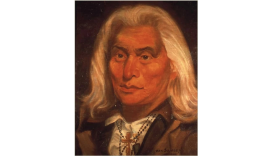If you’re one of the few Michiganders who has visited the State Capitol more recently than their elementary school field trip, the Anderson building might ring a bell. Home to the Michigan House of Representatives, the building pays homage to the first Native American woman to serve in a state legislature.
Cora Reynolds Anderson was born and raised in L’Anse, Michigan near the Keweenaw Peninsula. A member of the Chippewa Tribe, Reynolds married her husband Charles Anderson with whom she opened a hotel and owned farmland. Before serving as a Representative, Cora was also a prominent member of The Grange.
Wenona Singel, assistant director of the indigenous law and policy center at Michigan State University and a member of the Little Traverse Bay Bands of Odawa Indians said, “She (Anderson) was elected in 1924 and served a year, and during that time period, it was very difficult period for tribes across the country, including in Michigan, in part because that was a time where it was very widespread for native children to attend Indian boarding schools.”
“So she was a leader in public health, public welfare and public welfare issues, including she was part of a committee that was responsible for leadership with regard to an industrial school for girls. But also she brought a public health service to Baraga County and Baraga County also employed its first public health nurse. And so these were issues that were very important to her.”
Cora Anderson was the first female and the first Native American to serve in the Michigan House of Representatives.
When asked why there is not much in Michigan's historical record about Cora Anderson's ancestry, Singel replied, “If you look at newspaper coverage of her service in the state legislature, that newspaper coverage also really downplayed and did not highlight that she was a native woman serving in the state legislature. And so I found that to be very interesting. It may have been that focusing on and highlighting her native ancestry may have made her a more controversial figure for election to the state legislature. So it may be that she chose not to emphasize that aspect of her ancestry and background.”
Cora Anderson passed away in 1950 in the Upper Peninsula's Pentland Township.
The Anderson House Office Building in Lansing was named in her honor in late 2000. In 2001, she was inducted into the Michigan Women's Hall of Fame.






